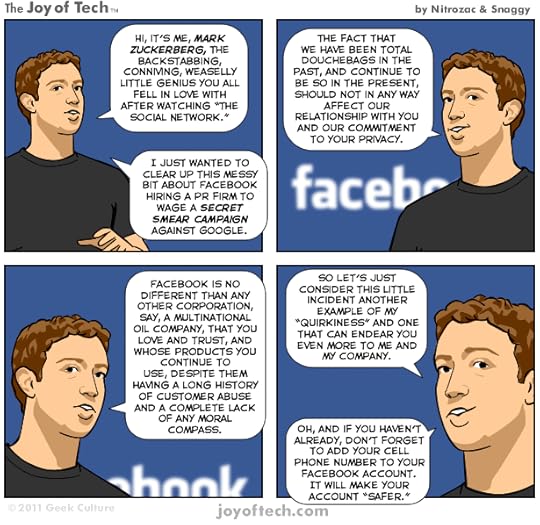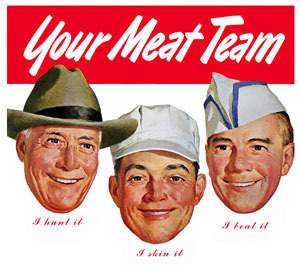Mark A. Rayner's Blog: Mark A. Rayner's Goodreads Blog, page 95
June 9, 2011
Diagram: Self-Awareness
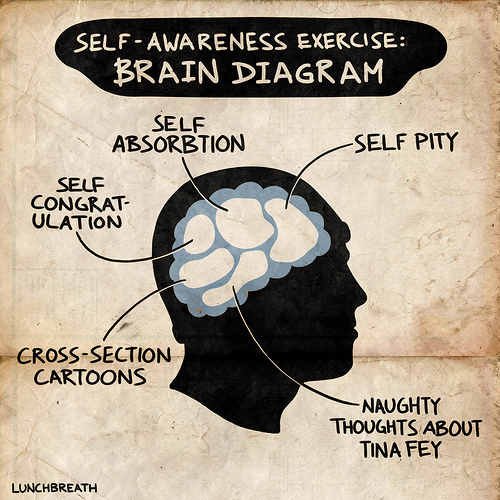
self awareness, a photo by lunchbreath on Flickr.
I'd have to have more brain space for "Thoughts of Tina Fey", except they would be "Thoughts of Charlize Theron".
Do I contradict myself?
Very well then I contradict myself,
(I am large, I contain multitudes.)
–Walt Whitman
Everyone thinks of changing the world, but no one thinks of changing himself.
–Leo Tolstoy
Alltop thinks the unexamined life is worth living, but then, it's a blog aggregator.

June 8, 2011
By all means, here is my cell phone number
This made me laugh, because I just put my cell number on my FB account. (Mostly so my friends could actually talk to me if they wanted. Not to be "safer".)
Alltop only asked for my blood-type.

June 7, 2011
The Curious Case of Toulouse Le Grandfig, Graphic Designer (Part Two)
For our first session, I thought I would try to understand Grandfig's psychosis through the medium of his art. I brought in the artwork he had been working on for a hat-maker, and had him role-play what the characters were saying to one another. [Figure 8]
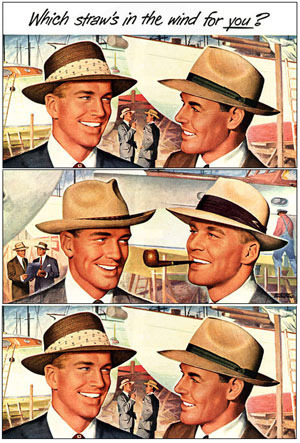 From recording of patient interview, April 26, 1951:
From recording of patient interview, April 26, 1951:
Dr. Cornelius: So what are the men in this first panel saying to one another Mr. Grandfig?
Gradfig's voice: Hey Bob, how are things going with the new job?
Great Jim, I've just been assigned to CEO cleanup in sector 6.
Really, how's that going?
Not well. They keep eating everyone. But at least I have this hat. Of course, it would be nice if it had a laser defense net too!
Dr. Cornelius: What is a laser defense net?
Grandfig: Something to keep the CEOs at bay. Long enough to find a baby or something to throw at them anyway.
Dr. Cornelius: What?
Grandfig: Should I do the next one?
Dr. Cornelius: Uh, I haven't fully absorbed the first, but yes, let's.
Grandfig: "Hey Steve how's that hat feeling. Is the laser defense net uncomfortable?"
"Mrfpp, mdhgtr, pank mawlk … mipe."
"Yeah, I had a cerebral embolism once too."
Dr. Cornelius: So you think the man with the pipe had a cerebral embolism?
Grandfig: Of course not. Jones is an idiot.
[sound of heavy sigh]
Dr. Cornelius: How about this last one?
Grandfig: Oh, they're in love.
[recording stops]
Apparently, Mr. Scott's amateur diagnosis is correct. Clearly, there are repressed issues afoot, so for our next session, I asked Grandfig to create a painting of his family, and he produced Figure 9:
June 6, 2011
The Curious Case of Toulouse Le Grandfig, Graphic Designer (Part One)
File #: 12-23571-X
Dr. Abe Cornelius
Bellevue Hospital — Psychiatric Triage Center
Entry 1: Dictated: April 25, 1951
The patient was brought into the hospital by several co-workers, including his immediate supervisor at Vandelay, Alderson, Pentergrast, Ilterton and Deckard, a mid-sized advertising company on Madison Avenue.
The Creative Director, Mr. Hillary Scott, introduced Mr. Grandfig to me, and said he was not only a renowned Dadaist, but that he had been working at his firm since late 1949 as a graphic artist.
It is worth examining Mr. Grandfig's work history to get a sense of the progress of his current disorder.
When Grandfig began working at Vandelay, Alderson, Pentergrast, Ilterton and Deckard (VAPID), he claimed to have arrived in New York from "distant lands" and needed to earn some money. He began working on the Petri account, which needed an "offbeat" touch. According to Mr. Scott, "Toulouse had a great feel for the material, and the odd touches tickled the fancy of our client."
Mr. Scott added: "The Petri campaign was quite successful, though frankly, all those rodents wearing cowboy boots were kind of disturbing."
Next Grandfig was put to work on the Arrow Shirts campaign, which was not as successful. Though he did not actually write the copy on this ad, Mr. Grandfig did inspire it with his artwork.
According to Mr. Scott: "This ad was trying to show how free you feel wearing Arrow Shirts, but frankly, it just screams to me of repressed homosexuality. That's probably why our client liked it so much."
Side note for later: examine possibilities of paper exploring how psychiatric terms have entered common parlance to the denigration of our profession.
From there he was put on the Jantzen account, for which Grandfig painted a number of lovely women sporting Jantzen's clingy (and to this psychiatrist's mind) deviant bathing wear. This went well up until sometime late in January, when Mr. Grandfig replaced the copy on the ad with his own.
What other survivors is he writing of? Survivors of the war? Are these troubling images the result of some kind of trauma suffered under the Nazis? I must explore this issue in depth.
After this gaffe, Grandfig was not given any more lettering work. Left with no actual language, Grandfig clearly subsumed his rage and paranoia into his actual artwork. One glance at these paintings for the Van Camp corporation will reveal the sinister and depraved undercurrent to his thoughts.
None as alarming as this actual artwork, which Mr. Scott mimeographed for my records. [Figure 5.] Notice the label. Instead of saying "Van Camp's Pork and Beans", it clearly reads "Van Camp's Long-Pork and Beans". Luckily, Mr. Scott caught this artwork before it went into production.
"Actually, I was torn on whether to stop it or not," Mr. Scott told me in our interview.
"Really?" I asked.
"Yes, I thought it would be amusing to see what would happen. To see if anyone caught the reference."
"But you decided against that?"
"Yes, but I have the original hanging in my office. It's quite brilliant."
Putting Mr. Scott's artistic proclivities to the side for the moment, it must be pointed out that long-pork is a reference to cannibalism. Has Grandfig been a participant or witness to such a morally proscribed event? Perhaps the other "survivors" he spoke of have done such a thing. I have heard it was difficult in Europe after the war, but I had no idea it was so serious. Perhaps it only happened in Belgium.
Next, he was caught sneaking into the lettering room to change the text on this advert for some grocery firm.
According to Mr. Scott, the issue was brought to a head when this advert for a Chase & Sanborn product went to press, was put on the product, and very nearly went to market.
Mr. Scott felt it was safest to bring Grandfig to the hospital for his own safety as well as that of his firm, VAPID.
According to Scott: "I'm pretty sure the copy writers were going to kill him if he changed any more of their work."
Continued in Part Two.
Many health care professionals are concerned about the proclivities of this funny firm.Originally published, June, 2008.

June 5, 2011
My heart is divided
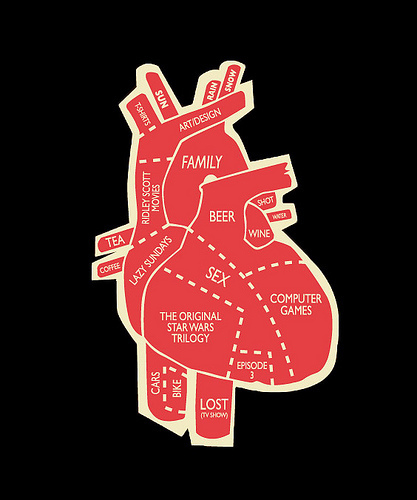
My heart is divided, a photo by Raid71 on Flickr.
I'd have to replace the original Star Wars Trilogy with friends.
Star Wars can move to where Lost is now. Cars/bike can be replaced by writing. T-shirts gets replaced by wind. Snow is replaced by beach.
I have no idea what Episode 3 is, but we'll leave it instead of replacing it with apathy.

June 3, 2011
Under the Blue Curve (Short Fiction)
 When Elisa sat down for lunch, Henry Overduin had no idea how much she was going to change his world.
When Elisa sat down for lunch, Henry Overduin had no idea how much she was going to change his world.
She and her colleagues from the Department of Corporate Oversight sat in Henry's section, but he would have noticed her even if they hadn't. There was something different and magnetic about Elisa Taper. The rest of the diners at Le Fou en Mer were unreserved cyborgs. Most of them wore their cranial implants in a showy style that was the vogue among the rich; Henry found the fashion tasteless. But Elisa's jet black hair was cut in a bob that just covered her implant. It was elegant. Her eyes were a startling emerald green, and there was something about the intelligence in them that captured Henry's attention.
She seemed completely natural — just like Henry.
Of course, he had no implants of any kind. Even on his waiter's salary he could have afforded one, but there was no point, because Henry was noneact. He had been unable to access the datasphere his whole life. When he was young, the world had begun integrating with it, and now the world was the datasphere. The latest generation of implants let humans access sensory experiences as well as information. Apparently, it was more real than real, his regular customers told Henry. Henry never wanted to be a waiter — he wanted to tell stories. But he had no audience. Without the datasphere, he didn't even have a medium. There were no books, no magazines, no newspapers. There wasn't a real movie industry anymore — it had all been swallowed by one all-encompassing ubermedia. Even conversation had been subsumed by it. The irony was there was a desperate need for Henry's originality in what the Germans called the weltgeschichte â€" the world story. But Henry's tales weren't part of it, because he couldn't be heard.
At least, not beyond the routine of taking orders and fetching drinks. Henry tried not to resent his job. In some sense, he was lucky he was able to work at all. Le Fou en Mer wasn't so expensive that a human chef ran the kitchen, but it was trendy enough that the clientele were all served by real humans. In addition to Henry, the other staff that day included two students from the city's main academy. For them, the job was something they would remember fondly after they had graduated to work remotely, or dynamically in the datasphere, depending on their abilities.
But for Henry it was one of the few jobs that he could hold, all thanks to his faulty, noneactive mind.
He tried not to dwell on it, while he walked over to the table where Elisa sat with her colleagues. He let them know the chef's specials that day, trying to be pleasant, and asked for their drink orders; it might have been obvious he found Elisa attractive, but he tried to disguise it. No matter, Elisa saw. She asked him his name, and was somewhat perturbed when he completely ignored her routine subvocal query.
Read the rest of the story at Abyss and Apex …>
Originally published, October, 2007.

June 2, 2011
Rozie
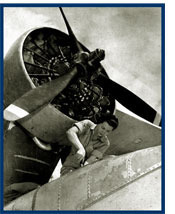 Rozie was a helluva' dame.
Rozie was a helluva' dame.
She could sink those rivets faster than a two-dollar fancy-girl could peel the wrapping off a sailor on shore leave, after he'd been at sea for several months, writing bad poetry and extended metaphors that ended up just kind of petering out, the way that an old man with a pipe full of wet monkey fur did, trying to light the mangy stuff with a can full of lima beans instead of a match or a zippo, or the right technology for the job.
Then the propeller cut off her head.
[From the Toulouse Le Grandfig Necrobiblia Collection]
More heroic attempts at comedy can be found at Alltop. Originally published, September 2008.

June 1, 2011
The Pillage People
 Though they were best known for their aggressive neo-fascist jazz stylings of classic Tyrolian folk tunes, The Pillage People were equally popular with a certain sect of gigantic silly hat fetishists. (You know who you are.)
Though they were best known for their aggressive neo-fascist jazz stylings of classic Tyrolian folk tunes, The Pillage People were equally popular with a certain sect of gigantic silly hat fetishists. (You know who you are.)
Pictured, from left to right are: Amanda Uhgenkitz (flugelhorn and pistol), Betrand "Stumpy" Russell (sousaphone, vocals and umbrella), Dennis "Don't Mind the Finger" Travesty (vocals and thermite grenade), Velaquez Eatme (guitar and pointed stick with razor attached to the end with duct tape), and Karl "The Beard" Marks (pocket xylophone, clarinet with flame attachment, and dictatorship of the proletariat).
[From the Toulouse Le Grandfig Necrobiblia Collection]
Alltop: humorphone and feedbag. Originally published August, 2007.

May 31, 2011
The Gruntwerx Paradigm
 Gunter was employed by the spectacularly successful IT consulting company, Gruntwerx.
Gunter was employed by the spectacularly successful IT consulting company, Gruntwerx.
Why was Gruntwerx the acme of the German IT world? Because they didn't whine. They didn't complain about anything. Complaining caused negative energy, wasted time, and brought everyone down, the CEO of Gruntwerx, Helga von Werthog, said.
"Two moans and you're out," she said. And she meant it. It was in all their employment contracts. Half of their analysts had been fired for whining on the job.
It was hard to argue with their success. Even with the downturn in the economy, revenue and profits were way up. But the strain was starting to show.
"Good morning, Gunter," his manager Berhard Dink said as Gunter walked into the office, a bit late. "You're tardy."
"Are you complaining about it?" Gunter asked.
"No, just noting the fact."
"Ah. My apologies. My train was delayed."
"And…"
"And that's okay!" Gunter enthused. He smiled as broadly as he could. Of course, he wanted to say, scream: "and it sucks. I get in trouble because the bloody train is late." But he did not. He was a happy, productive worker. He had a job.
He also had an ulcer, and a throbbing vein in his temple that was worrying. His co-workers dealt with the stress in other ways. Werner had taken up karate and self-flagellation. Hedrick was on a cocktail of mood-altering drugs that kept him happy, sedate, and incapable of enjoying marital relations with his leggy wife, Lisle.
Gunter had been looking for employment elsewhere, someplace where he could speak his mind on occasion. But it was a shrinking market, not to mention that more and more companies, particularly in the IT industry, had taken up the Gruntwerx paradigm.
The only thing that was keeping him sane was his hobby, taxidermy, and the self-help group that had formed from the most disgruntled Gruntwerx employees — they meant once a week for what they called sessions of "über-bitch".
He would survive it. He'd survived countless other management fads: TQM, quality circles, excellence, matrix management, and on, and on. He would survive the Gruntwerx paradigm too. He sat down at his desk and began the work day, content with the knowledge that he would rise above von Werthog and her corporate censorship.
There was a hubbub in the common area, where a TV was usually on showing the news. His co-workers looked worried, as they watched. It was their Chancellor, announcing a new sweeping law based on the Gruntwerx paradigm.
"If Germany is going to weather this global economic crisis, we must change the way we think. We must be positive. From this day forward, the German people are not allowed to complain, whine, whinge or moan about things, under penalty of law," he said.
"Isn't it wonderful?" Bernhard Dink asked the assembled Gruntwerx employees.
"Oh . . . uh, yes, yes," they all muttered, but not Gunter.
He was already back in his office, calling an old army buddy, who dealt in illegal arms.
You know who else is really thrilled? Alltop . Thanks to Jan Tik for the photo. Originally published, December, 2008.

May 30, 2011
A Typical Monday in C Troop
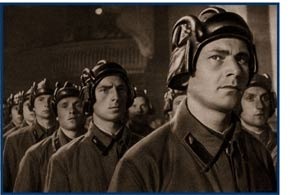 It was a typical Monday for Ivan, Drone (first class) of the Galactic Space Forces, C Troop. Muster after a breakfast of space-gnoort porridge, and then a briefing on the day's activities.
It was a typical Monday for Ivan, Drone (first class) of the Galactic Space Forces, C Troop. Muster after a breakfast of space-gnoort porridge, and then a briefing on the day's activities.
In the middle of the briefing, exciting news came over the ansible and was relayed to C Troop. Those damn rebels had been tracked down (finally) and today there would be fighting. They would be manning one of the blaster batteries, which was not in tip top condition.
Two rows behind Ivan, Boris was wondering what they'd be serving for lunch.
Ivan had other things on his mind. He was pretty sure that he didn't like the sound of "radiation seepage." And there was something funny about that Darth fellow too.
You may also be interested in the "seepage" from href="http://humor.alltop.com">Alltop. Originally published August, 2008.

Mark A. Rayner's Goodreads Blog
More about the book, including links to podcasts, excerpts If you'd like to read my second novel, you can enter for a draw, where I'm giving away five copies: http://www.goodreads.com/giveaway/sho... .
More about the book, including links to podcasts, excerpts and how to contact me here: http://marvelloushairy.ca">ma... ...more
- Mark A. Rayner's profile
- 168 followers




